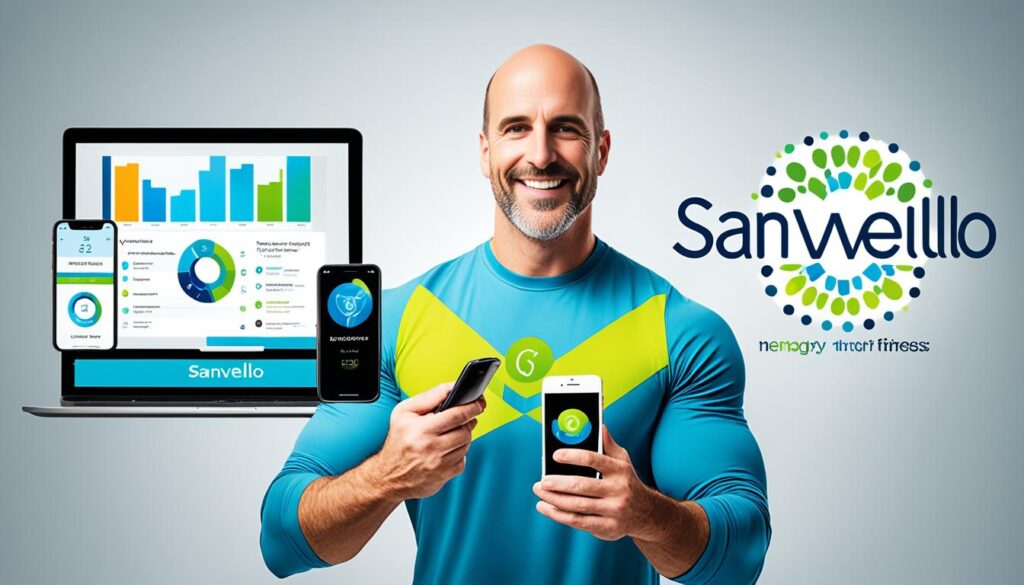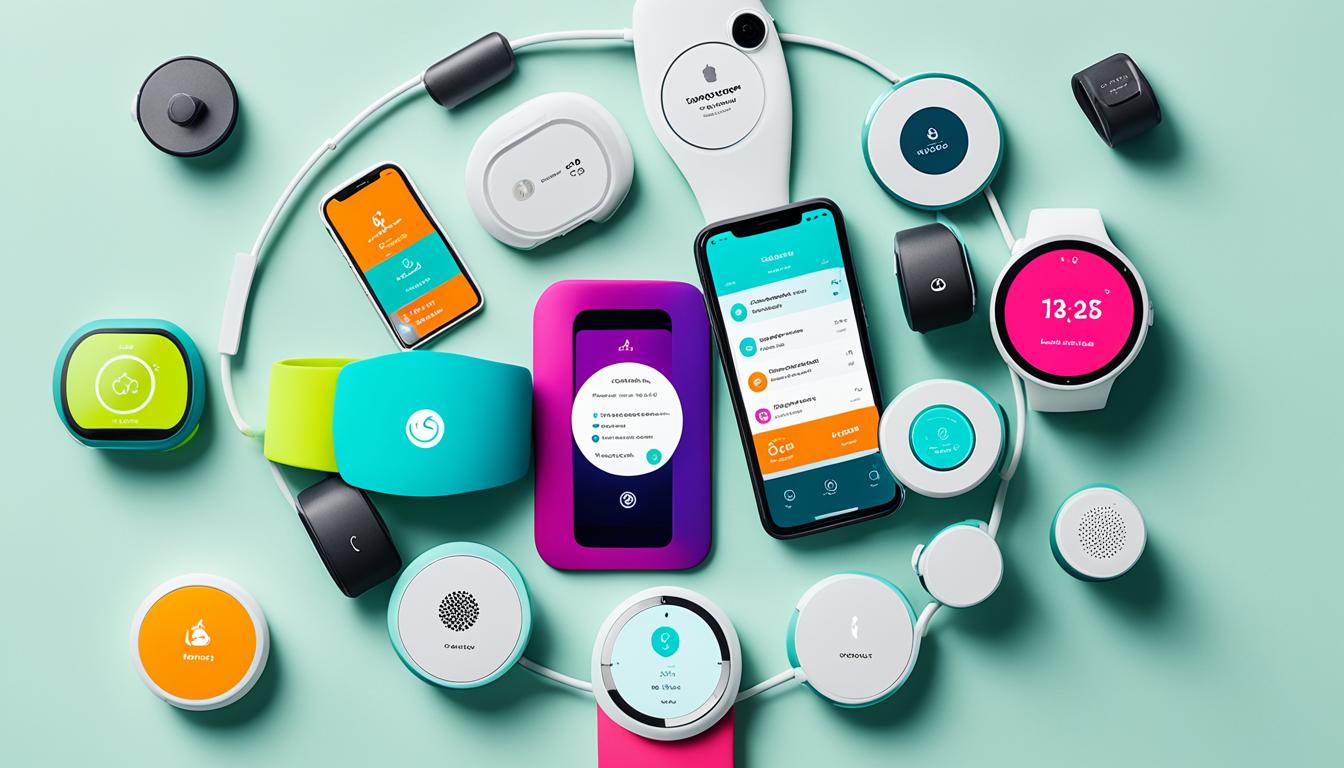Did you know nearly 50 million U.S. adults struggle with mental illness1? Sadly, less than half get the help they need2. Mental health apps can fill this gap, offering tools like relaxation exercises and mood tracking. They help you manage your mental health.
Smartphones are a big part of our lives now. Using mental health apps can be a key part of staying motivated. These apps aren’t a full replacement for therapy, but they offer proven methods like Cognitive Behavioral Therapy (CBT) and mindfulness. Apps like Calm, Headspace, Sanvello, Happify, and Bearable can help you improve your mental health.
These apps are easy to get and don’t cost much. For instance, Calm costs $69.99 a year3, and Talkspace starts at $69 a week3. Adding these tools to your self-care can greatly improve your mental and physical health.
Introduction to Mental Health-Focused Fitness Apps
Mental health-focused fitness apps are becoming more popular as they help fight anxiety, depression, and other mental health issues. With over 10,000 apps for mental health, choosing the right one is key4. These apps aim to relax, reduce stress, and boost mood, leading to a better life balance. They offer treatment on demand, which is great for those who can’t make it to in-person sessions4. Also, one in four people worldwide will face a mental or neurological disorder, showing the need for these digital tools5.
Apps for mental health are often cheaper than traditional therapy, making mental wellness support more reachable for many4. But, it’s important to check if these apps work as well as regular therapy4. Keeping user data safe is also key since these apps deal with personal info4.
These apps use tech like neuroscience and gamification to help improve mental health. Apps like Moodpath and Happify let users track their mental health. TalkLife connects people who are going through tough times5. These features make users more engaged and help them manage their feelings better.
The need for new ways to tackle mental health issues has led to the growth of apps like these. Issues like stigma, cost, and access to care have made these apps more appealing5. In 2020, more people suffered from anxiety and depression, thanks to COVID-19, showing we need easy-to-use mental health tools6.
The mental health apps market was worth $6.2 billion in 2023 and is expected to grow fast, at a 15.2% CAGR from 2024 to 20306. These apps are available all the time, helping to overcome location and time barriers, reaching many users6. They can also help healthcare workers by automating tasks, making therapy more efficient6.
Calm: Mindfulness and Fitness Partner App
Calm helps users find peace and focus, leading to a better life. It’s a hit, with over 100 million users worldwide and gaining 100,000 new ones every day7.
Key Features
Calm has lots for adults and kids:
- Guided meditations
- Over 100 special sleep stories to help you sleep better and feel happier7
- Relaxation tools like sounds, breathing exercises, and stretches7
- Programs for mindfulness, from 7 to 21 days long
- Daily 10-minute sessions like Daily Calm with Tamara Levitt and Daily Trip with Jeff Warren to ease anxiety and relax7
“Calm is trusted by top psychologists, therapists, and mental health experts for its role in mental wellness and fitness”7.
User Experience
Calm is easy to use, with a simple design. It lets you find and enjoy its wide range of content. The “Calm Body” feature offers gentle exercises for physical relaxation. There’s also a special kids section, making it great for all ages. Plus, no ads means a smoother experience7.
But, some premium content might cost extra7. Still, NC State folks get big discounts on apps like Headspace and BetterYou. These apps are free for the first 4,000 students at NC State, and the BetterYou app is free thanks to a UNC System grant8.

Calm mixes guided meditations, sleep stories, and relaxation techniques. It’s a top choice for improving mental health and well-being.
Headspace: Mindfulness Partner to Boost Mental Health
Headspace is a top mental wellness tool with stress management courses for everyone. It has over 100 million users worldwide. It offers different subscription plans to fit various budgets and preferences9.
Subscription Plans
Headspace has subscription plans for everyone. The monthly plan costs $12.99, and the yearly plan is $69.99. Both come with a seven and 14-day trial10.
Students in certain countries get an 85% discount by using SheerID, making the yearly plan $9.999. There’s also a family plan for up to six accounts at $99.99 a year9. Headspace offers free access to some groups through partnerships9.
Personalization and Customization
Headspace lets users tailor their experience to their mental health goals. It has over 500 guided meditations and programs for all levels10. You can pick courses on mindfulness, stress, and sleep, with 60 courses and 5 to 15 meditations each9.
The app also has low-impact exercises and mindful cardio in the move tab9. The Sleep tab offers meditations and sounds to help you sleep better, leading to deeper relaxation10.
Here’s a detailed table of their subscription plans:
| Subscription Plan | Description | Cost |
|---|---|---|
| Monthly Plan | Access to all features, billed monthly | $12.99/month10 |
| Annual Plan | Full access with longer trial period, billed annually | $69.99/year10 |
| Student Plan | Discounted annual plan with verification | $9.99/year9 |
| Family Plan | Up to six accounts bundled, billed annually | $99.99/year9 |
Sanvello: Cognitive Behavioral Therapy on Your Smartphone
Sanvello is an app that helps people deal with stress, anxiety, and depression. It offers mood tracking, guided meditation, coping tools, and peer support. You can get it for free or pay $8.99 a month11. The U.S. Preventive Services Task Force says everyone should be checked for anxiety because it’s so common11.
Sanvello has a strong community where people can support each other safely12. It’s all about helping you with your mental health in a full way. You can get coaching, therapy, articles, and videos to help you out.

The app helps you track your mood and find ways to cope with anxiety12. It even helps you find a therapist. Mental health issues like anxiety and depression are getting more common, showing we really need tools like Sanvello11.
Sanvello’s message boards are great for sharing stories and support12. If you need help with stress or want to track your mood, Sanvello has it all.
“Sanvello has been a game-changer for me. The cognitive behavioral therapy exercises and peer support have significantly improved my mental health,” said one user from California.
Sanvello mixes therapy with community support to help with mental health. It’s a top choice for those looking for help with anxiety and better mental health.
Happify: Games and Activities for Mental Well-being
Happify uses a unique approach to mental health with its positive psychology app. It offers assessments, mental health exercises, and emotional well-being games. Users get challenges to help with stress, relationships, and work satisfaction. Millions of users say they feel better after doing a few activities each week13.
Happify has many tracks for different themes like sleep, stress, loneliness, and racism14. Activities range from quick games to longer tasks. You can play mini-games, do breathing exercises, or send compliments to friends14. These activities help fight worry, improve relationships, and help you sleep better13.
Users have seen big improvements in handling negative thoughts and work stress. They also feel more productive and positive13. But, the app might be hard for people with ADHD due to its varied exercises and unclear time needs14. Some users didn’t like the mini-games as much as others they could buy14.
Happify is full of tools and programs made by experts in positive psychology and mindfulness13. It also has “The Upside” section with lots of mental health articles. Users can filter these articles and sign up for email updates14.
If you want to try Happify, there’s a free version with some content. You can also choose from monthly, yearly, or lifetime subscription plans14.
Bearable: Comprehensive Health Tracking App
Bearable is a powerful app that helps users manage their mental health. It tracks moods, symptoms, anxiety, sleep, diet, exercise, supplements, and medication15. By logging both feelings and health data, it gives a full view of your well-being. It includes tracking heart rate, sleep, and steps for a complete mental health picture15.
Tracking Your Mental Health
Bearable makes tracking mental health easy. It helps you spot your triggers and understand your mood patterns. Made with input from patients, it ensures it meets user needs15. The app uses graphs and timelines to show your health data clearly. These tools are key for tracking your mood and seeing how your lifestyle affects your mental health16.
Personalized Insights
Bearable offers personalized insights from your health data. It shows how different things affect your mental health16. The app also reminds you to keep tracking, helping you stick to your health plans. With a 73% user satisfaction rate, Bearable proves effective in helping users manage their mental health16.



